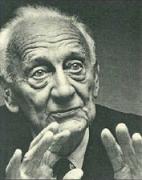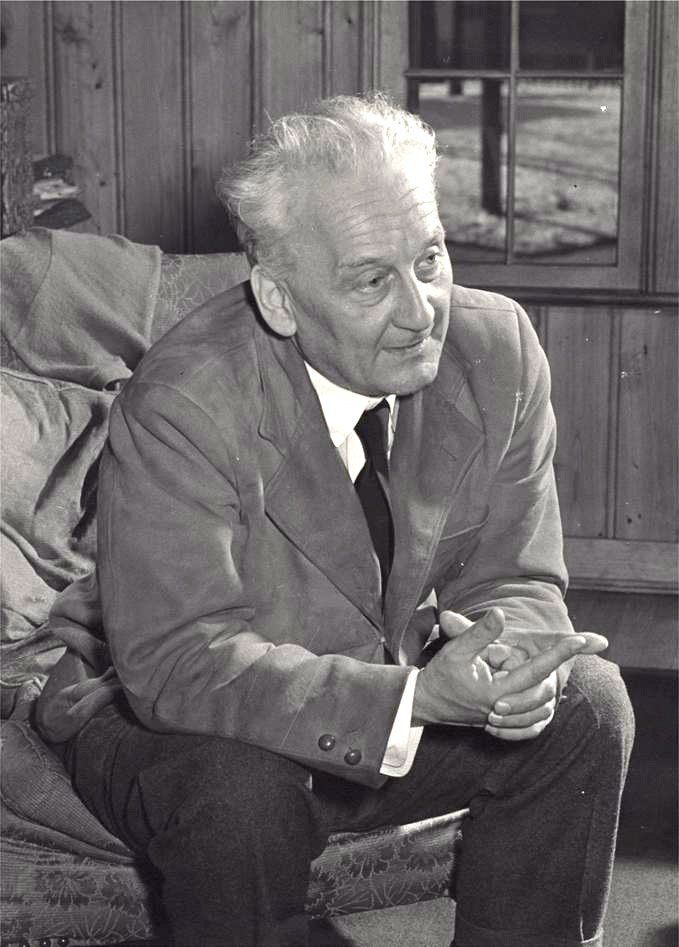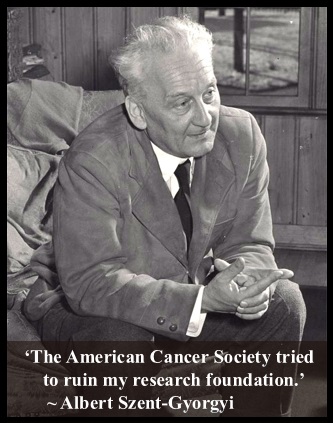 1893-1986
1893-1986Albert von Szent-Györgyi, Ph.D.
 1893-1986
1893-1986
Dr. Szent-Györgyi depended on thought, as did Pauling, rather than on equipment." wrote Abram Hoffer. Albert Szent Györgyi was born in Hungary and spent the First World War in the Austrian army. After the war, he studied at Groningen and with Hopkins at Cambridge. C. It was here that he became interested in a chemical agent, present in plant juices, which had the effect of delaying oxidation, such as the browning of a sliced apple exposed to the air. He suggested that this agent, which was also present in cabbages and oranges, was the mysterious Vitamin. By 1933, he had isolated the substance in kilogram lots and named it "ascorbic acid" which means "the acid which prevents scurvy." "During World War II, Szent Györgyi was in constant danger from the Nazis and finally took refuge in the Swedish legation in Budapest. The Gestapo raided the legation but he escaped and remained in hiding for the rest of the war. He was rescued by the Russian armies and taken to Moscow on the direct orders of Molotov. He was well treated by the Russians but, knowing he could not work in their system, he went to the United States in 1947 where he settled at the Marine Biological Laboratories at Woods Hole, Massachusetts." (Excerpted from Albert Szent-Györgyi and Vitamin C, by Nigel Bunce and Jim Hunt, University of Guelph, 1987) "Albert Szent-Gyorgyi, PhD, won the 1937 Nobel Prize for his discovery of vitamin C. In fact, it was he who named the vitamin ascorbic acid and first predicted its use in cancer. When Szent-Györgyi was on his deathbed, at the age of 93, Linus Pauling flew from California to Szent-Györgyi's home at Woods Hole, Mass., to say goodbye. Holding his hand, Linus said wistfully, "You know, Albert, I always thought that someday we two would work together." Szent-Györgyi looked up and said, humorously, "Well, if not in this life, then maybe in the next." Pauling himself died a few years later, also at age 93. They were two of the greatest thinkers of the 20th century. "(Ralph W. Moss, Ph.D., Cancer Decisions Newsletter, July 18, 2004)
"Mr X has a lack of vitamin C and contracts a cold. The cold leads to pneumonia. Mr X dies and his body is taken to the mortuary…not with the diagnosis "lack of vitamin C", but with the diagnosis "pneumonia". This does not matter for him any more, but matters for the rest of mankind, which is mislead in its thinking and judgement about vitamins."---Dr Albert Szent-Gyorgyi, nobel prize winner for discovering Ascorbate.
"The American Cancer Society tried to ruin my research foundation." -Albert Szent-Gyorgyi, discoverer of vitamins C and P, 1937 Nobel Prize ," for his discoveries in connection with the biological combustion process, with special reference to Vitamin C and the catalysis of fumaric acid.".
"...What kills science in this country now, (is) that you must tell in advance what you will find, and what you will do exactly, and what you will spend your money on. And if you knew it all, then you wouldn't need to do it. ... And so you cannot have (any) new discoveries." - Albert Szent-Gyorgyi, discoverer of Vitamin C
[1979 Enloe] How Vitamin C Really Works... or Does It? Enloe, Nutrition Today, 1979

